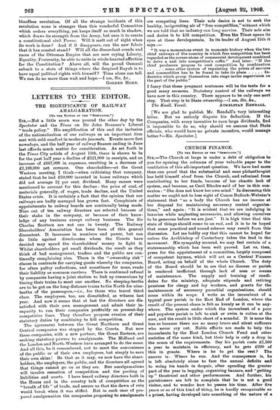CHURCH FINANCE.
[To THU EDITOR 011. Tag ''SPROTATOR.1 Ssa,—The Church at large is under a debt of obligation to you for opening the columns of your valuable paper to the ventilation of this all-important question. We have had more than one proof that the substantial and sane philanthropist has held himself aloof from the Church, and refrained from contributing to her funds, because of her chaotic lack of system, and because, as Cecil Rhodes said of her in this eon. nexion : " She does not know her own mind." In discussing this matter we ought not to lose sight of Canon Bullock-Webster'e statement that " as a body the Church has no income at her disposal for maintaining necessary central organisa- tions," and again : "It is evident that we are indulging in luxuries while neglecting necessaries, and allowing ourselves to be generous before we are just." It is high time that this state of things should come to an end, and it is to be hoped that some practical and sound scheme may result from this discussion. Let me boldly say that this cannot be hoped for unless the Archbishop of Canterbury takes the lead in the movement. His sympathy secured, we may feel certain of a statesmanship which has been well proved. Let us, then, press for the appointment of a committee, largely composed of competent laymen, which will act as a Central Finance Board, acting on behalf of the whole Church. The duty of the Board should be to see that no diocese or parish is rendered inefficient through lack of men or means of maintenance. The supply and training of candi- dates for the ministry, adequate stipends and retiring pensions for clergy and lay workers, and grants for the maintenance of necessary parochial organisations, should come within its scope. I write as the incumbent of a typical poor parish in the East End of London, where the result of the present chaos is felt as keenly as it can be any- where. The system under which the incumbent of a poor and populous parish is left to sink or swim is rotten at the core, and the result is little short of a scandal. It is none the less so because there are so many brave and silent sufferers who never cry out. Noble efforts are made to help the incumbents by the East London Church Fund and other societies of the same kind, but their help is only a drop in the ocean of the requirements. Say his parish costs £1,500 a year to maintain in efficiency, and he gets 2200 of this in grants. Where is he to get the rest P The answer is : Where he can. And the consequence is, he is left absolutely alone to face the annual deficits end to wring his hands in despair, after spending the greater part of the year in begging, organising bazaars, and "getting up" theatrical and other performances. And further, his parishioners are left to complain that he is not a good visitor, and to wonder how he passes his time. After five years or so of this kind of thing, he is hardly recognisable' as a priest, having developed into something of the nature of a financial agent with a clerical collar. To obviate this unde- sirable state of things we must urge upon the Central Finance Board, as soon as it is formed, (1) to acquaint itself with the condition and cireumetances of every parish, rich and poor; (2) to assess each parish for contribution to the General Fund; (3) to finance each parish according to its require- ments ; (4) to allow no organisation in any parish unless the needful funds are obtainable ; and (5) to establish a system of audit which would save the incumbent of every parish under the scheme from financial liability, and set him free to perform the solemn duties for which he was ordained.—I am,



































 Previous page
Previous page